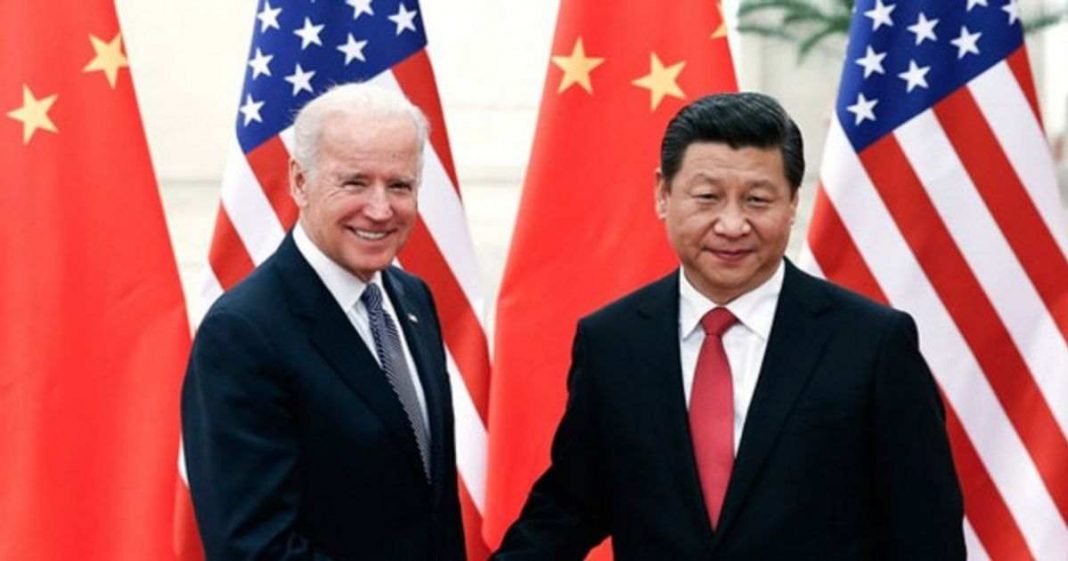|Hassan Tahir
With President Joe Biden in office, the erstwhile tense relations between China and the United States are witnessing a relative calm. In his address to US Congress on the eve of his first hundred days in office, the US President made it clear that “his country wanted competition and not conflict with China,” unlike his predecessor Donald Trump who had termed Beijing as a “Strategic Rival.” The new administration’s approach towards China seems plausible and safer for the entire world.
During the first call to his Chinese counterpart President Xi Jinping, Joe Biden welcomed competition but reiterated his commitment to protecting his country’s national interests. He has also cautioned America’s allies about the stiff competition with China in decades to come.
Read more: Biden wants no conflict with China and Russia, seeks diplomacy instead
This is an optimistic change as it indicates Washington’s renewed commitments of moderating the great power competition through increased interactions and engagement with Chinese officials. Washington’s return to the Paris Accord and the World Health Organization (WHO) are testaments of its changing policies that will lead to a congenial platform for interaction between the two great powers.
Though Washington has not yet taken any substantial step to reduce hostility towards Beijing, the tone and approach opted by Biden’s administration are relatively softer. In a bid to reconcile the relationship, both sides had a diplomatic conversation in Alaska where their top diplomats exchanged concerns and reservations on a number of issues.
Read more: US and China: What has changed with Biden Presidency?
The meeting ended on a positive note, particularly from the Chinese perspective who noted that the “strategic exchange was frank, constructive and helpful”, signaling a more favorable attitude toward the US; and was certainly very different from the last two years of Trump’s administration. It also indicated the duo’s inclination towards peace and tendencies of cementing ties in the years ahead.
US relations with China evolving?
In the first Climate Change Summit hosted by the US President this year, participation by Xi Jinping on Biden’s invitation was another encouraging sign for future cooperation on converging issues.
In his virtual address, the Chinese President called for mutual efforts to preserve “man and nature” to build a community of life together. The threats posed by climate change and the damage inflicted by COVID-19 demand a collaborative approach on the international level to deal with their fallout.
Washington’s change in policy to moderate and manage its competition with Beijing presents prospects for both the contenders and will bring development to many deprived regions.
Read more: US and China wants a do-over over their trade policies
On April 21st this year, the US Senate Foreign Relations Committee approved the Strategic Competition Act of 2021 that intends to increase the financial aid to Africa and Latin America in order to match China’s financial assistance to these countries, extend greater funding for US technology industries, and strengthen the “International Development Finance Corp” to compete against the “China Development Bank”, which has played an instrumental role in Beijing’s ambitious Belt and Road Initiative (BRI).
This is a true manifestation of the Biden team’s mindset reflected during the campaign last year as Jake Sullivan, Biden’s National Security Adviser, outlined that this new direction should put less focus on trying to slow China down and more emphasis on trying to run faster ourselves through enhanced government investment in research and technologies like semiconductors, Artificial Intelligence, energy, etc.
Read more: US-China exposing the myth of Thucydides’ Trap
Lessons from Cold War
In order to best manage this competition, China and the US must work to devise a collaborative mechanism as there is a very thin margin for error and any misstep could lead to a troubled relationship. Particularly, race in technological advancements and Artificial Intelligence between two leading giants may push their competition towards dangerous dynamics.
Veteran US statesman Henry Kissinger, while talking to McCain Institute’s Sedona Forum recently, warned American and Chinese leadership of perils of aggravating ties. He told the Forum that “while nuclear weapons during the Cold War between the US and the Soviet Union had the capacity to inflict vast damage, that capacity for destruction has been exceeded by nuclear technology and artificial intelligence capabilities that US and China now have at their disposal.”
Read more: US ousts China from Romania nuclear project
Taking lessons from the Cold War, both Washington and Beijing must work to start working together on issues like Strategic Arms Limitation Talks (SALT-I and II) or Intermediate-Range Nuclear Forces (INF) Treaty, to curb fast technological developments in AI or nuclear arsenals/proliferation.
At present, there are no defined rules or principles that administer contests in these new domains. During the Cold War, the above-mentioned measures significantly helped in managing the great power rivalry between the former Soviet Union and the US and kept the world safe from nuclear catastrophe.
Read more: Are Russia and US going to become best friends?
Similar framework(s) or mechanism(s) are required now to cope with any adverse effects of the ongoing Sino-US contest and prevent the world from witnessing another protracted tussle between two superpowers that may cause a doomsday scenario for the entire world.
Hassan Tahir is a researcher at the Centre for Aerospace & Security Studies (CASS). He can be contacted at: cass.thinkers@gmail.com.The views expressed in the article are the author’s own and do not necessarily reflect the editorial policy of Global Village Space.














